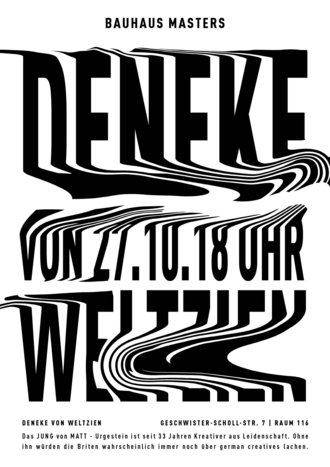27.10. Deneke von Weltzien @ Bauhaus Masters
Im Rahmen Veranstaltungsreihe »Bauhaus Masters« an der Bauhaus-Universität Weimar begrüßen wir am Dienstag, 27. Oktober 2015, Deneke von Weltzien. In seinem Vortrag wird der Grafikdesigner über seine zehn größten Fehler reden.
Deneke von Weltzien ist Seit 33 Jahren Kreativer aus Leidenschaft. Als Grafikdesigner war er eine der drei wichtigsten Figuren der JUNG von MATT Anfangsjahre. Von Weltzien hat die internationale Wahrnehmung und Anerkennung deutscher Marketingkommunikation massgeblich beeinflusst.
Zeit:
Dienstag, 27. Oktober 2015
18 Uhr
Ort:
Fakultät Gestaltung
Van-de-Velde-Werkstatt, Raum 116
Geschwister-Scholl-Straße 7
99423 Weimar

